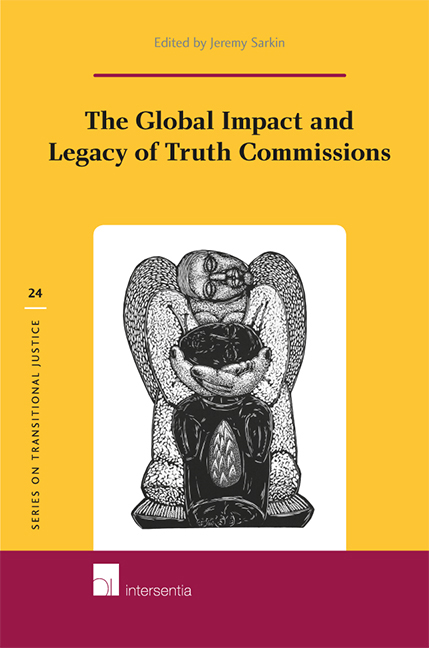Book contents
- Frontmatter
- Acknowledgements
- CONTENTS
- List of Contributors
- Introduction: Contextualising and Understanding the Global Role, Impact and Legacy of Truth Commissions
- Is Anyone Listening? A Review of the Research on Attitudes Towards Truth Commissions
- Assessing the Long-Term Impact and Legacy of Truth Commissions
- The Global Textual Legacies of Truth Commissions: Narratives on Sexual Violence in the Reports of Sierra Leone, Liberia, Kenya and Beyond
- The Implementation Record of Truth Commissions’ Recommendations in Latin America
- In the Aftermath of Truth: Implementing Truth Commissions’ Recommendations on Reparations – Following Through for Victims
- Truth Commissions and Social Justice: ‘Wishful Thinking or Not Very Thoughtful Wishing’?
- Transitioning Toward Dignity
- Towards an Understanding of How Truth Commissions Can Use Their Amnesty Powers to Enhance Their Impact and Legacy
- Truth Commissions in Non-Transitional Contexts: Implications for Their Impact and Legacy
- Surrogacy and Resistance: Evolving Patterns in Unofficial Truth Commissions and Truth Projects
- Index
Transitioning Toward Dignity
Published online by Cambridge University Press: 26 June 2019
- Frontmatter
- Acknowledgements
- CONTENTS
- List of Contributors
- Introduction: Contextualising and Understanding the Global Role, Impact and Legacy of Truth Commissions
- Is Anyone Listening? A Review of the Research on Attitudes Towards Truth Commissions
- Assessing the Long-Term Impact and Legacy of Truth Commissions
- The Global Textual Legacies of Truth Commissions: Narratives on Sexual Violence in the Reports of Sierra Leone, Liberia, Kenya and Beyond
- The Implementation Record of Truth Commissions’ Recommendations in Latin America
- In the Aftermath of Truth: Implementing Truth Commissions’ Recommendations on Reparations – Following Through for Victims
- Truth Commissions and Social Justice: ‘Wishful Thinking or Not Very Thoughtful Wishing’?
- Transitioning Toward Dignity
- Towards an Understanding of How Truth Commissions Can Use Their Amnesty Powers to Enhance Their Impact and Legacy
- Truth Commissions in Non-Transitional Contexts: Implications for Their Impact and Legacy
- Surrogacy and Resistance: Evolving Patterns in Unofficial Truth Commissions and Truth Projects
- Index
Summary
INTRODUCTION
While each country experiences conflict differently, develops unique mechanisms of transitional justice, and structures and empowers its truth commissions to suit its particular needs and capacities, the endpoints are Often similar: at least in their public commitments, countries invariably aspire to craft an inclusive society in which all citizens are engaged for the betterment of the individuals and communities that comprise the nation. This, it is presumed, will end violence and avoid its recurrence, and bring about lasting peace. These are, without a doubt, broad and ambitious goals, indicating deep transformations in statecraft, in the social fabric, and even in the psychology of the people. Thus, there is a link between how people feel about their society, how they engage in it, and the political and social spaces that both produce and result from that engagement. Human dignity, which has both individual psychological dimensions and relational social dimensions, links the personal and the political aims of transitional justice.
Often, the architects of transitional justice establish truth commissions for the stated purpose of moving toward the fulfilment of these goals. Truth commissions do not have the jurisdictional authority or the resources to accomplish any of these goals on their own, but they can galvanise institutions of the state and civil society to take action. They cannot draft constitutions and laws, but they can develop the framework for legal reform, identify the fundamental values that legal reform should embody, and identify the essential terms that legal reform should adopt. They typically do not have the authority to pay reparations, but they can identify the goals of a reparations programme and insist on its realisation according to a set timeframe. They cannot write a new curriculum, but they can frame the essential factual and historical accounts in a way that respects all legitimate perspectives and they can articulate the fundamental lessons of human rights to be inculcated. They cannot, on their own, define citizenship and nationhood, but they can reflect and embody the equal value of each person that demands respect for all. Truth commissions, then, have little power actually to make change, but they wield significant power to articulate the terms of debate and to create the framework in which social and political change will take place.
- Type
- Chapter
- Information
- The Global Impact and Legacy of Truth Commissions , pp. 189 - 210Publisher: IntersentiaPrint publication year: 2019
- 1
- Cited by

